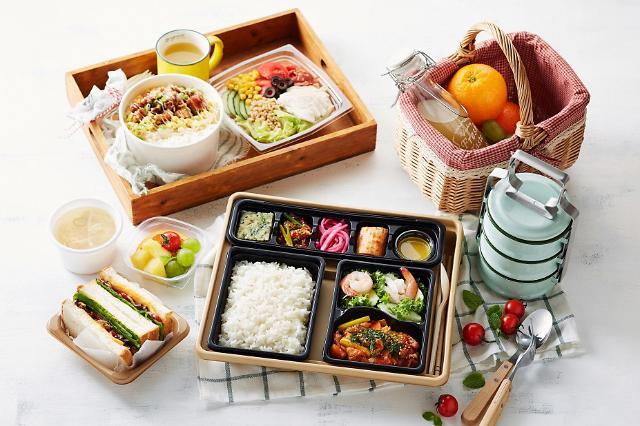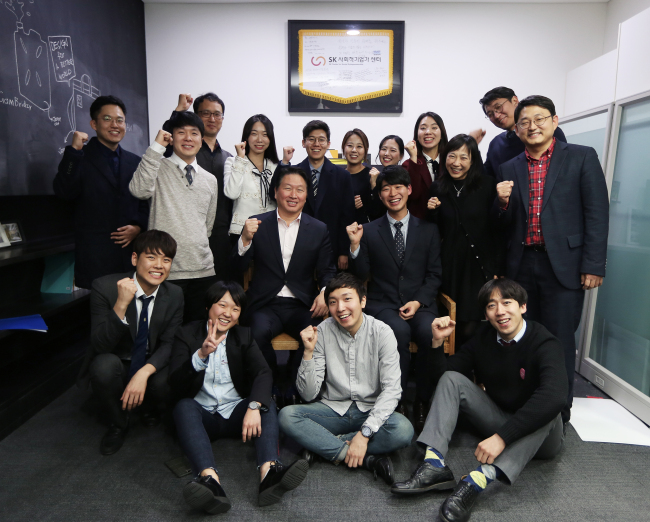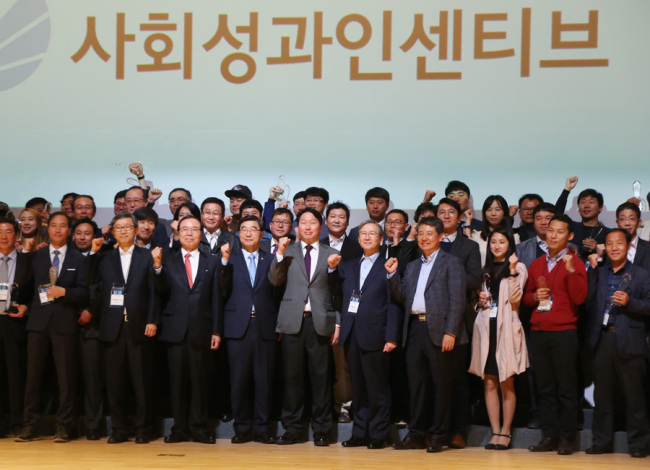Conglomerate’s social enterprise to supply meals during Winter Games
Over a period of 44 days surrounding the 2018 PyeongChang Winter Olympics from Jan. 14 to Feb. 26, some 36,000 meals are to be delivered to members of the staff and cast residing in 33 residences in the vicinity.
And the company designated for the job is Happy Dosirak, or Happy Meal Box.
 |
Happy Dosirak‘s meal boxes to be provided to the 2018 PyeongChang Olympics staff |
The company is one of the social enterprises run by nonprofit fund Happiness Foundation, an affiliate of SK Group, the nation’s second-largest conglomerate in market capitalization.
Aside from its participation to the PyeongChang Games, the meal company has been providing public meal services and jobs for the socially disadvantaged since 2006.
“SK has been making sustainable efforts to solve social problems by providing meals for the socially vulnerable,” said Kim Yong-kap, chief director of the foundation.
“We hope to contribute to the success of the PyeongChang Winter Olympics with our high quality nutritious meals.”
As part of efforts to promote Gangwon Province, where PyeongChang is located, the caterer developed a new brand called “Gangwon Banquet,” a series of meals using local ingredients such as pine mushrooms, braised dried pollack and buckwheat, officials said.
While lunches and dinners have mostly been provided in conventional Korean-style meal boxes, breakfasts are provided in a lighter form, consisting of sandwiches, porridge, salad and fruit, making it easier for the staff to eat on the go during commuting hours.
Partners in the project are Gangwon Social Economy Center, which provides the containers, and local governments in charge of snow removal to facilitate meal delivery.
Late last year, SK Group became the first among local conglomerates to establish a private equity fund to invest in social enterprises.
 |
SK Group Chairman Chey Tae-won (center) meets with graduates-to-be of KAIST’s social entrepreneur MBA course in December. The conglomerate has given a total of 9.5 billion won ($8.75 million) to the academic program since 2012 and is planning to inject an additional 12.5 billion won over the next five years. (SK Group) |
The move came in line with Chairman Chey Tae-won’s long-held vision to become more socially aware and active. Corporate outreach to foster social enterprises has long been a core vision for the SK chief.
“A higher number of social enterprises will improve our society’s problem solving capacity and promote sustainability,” he wrote in a book in 2014.
Chey had earlier called for the need to create over 100,000 social enterprises in the upcoming years to account for about 3 percent of the nation’s gross domestic product.
For the private equity fund, SK’s Happiness Foundation has so far invested 4 billion won ($3.69 million) into the project, while KEB Hana Bank has invested 1 billion won. IBK Securities, the brokerage affiliated with Industrial Bank of Korea, will operate the program and also discover promising social enterprises.
Social enterprises, which seek to improve human society and the environment through business activities, often face challenges in attracting investments, and investors likewise find it difficult to recognize worthwhile businesses.
 |
SK Group Chairman Chey Tae-won (front row, center) attends the group‘s incentive delivery ceremony for social enterprises in April last year. (SK Group) |
The long-term goal is to create a mutually beneficial matching platform for both sides and eventually to contribute to the nation’s sustainable growth, according to group officials.
In 2015, the group kicked off a program to offer financial incentives to social enterprises that manage to achieve their yearly targets of social value. Last year, it gave out some 4.8 billion won in incentives to 93 social enterprises.
Reflecting its top chief’s drive for social value and social enterprises, the group is to start a new personnel evaluation system this year to reflect social value achievement in the evaluation criteria of affiliate CEOs.
By Bae Hyun-jung
(
tellme@heraldcorp.com)










![[Today’s K-pop] Blackpink’s Jennie, Lisa invited to Coachella as solo acts](http://res.heraldm.com/phpwas/restmb_idxmake.php?idx=644&simg=/content/image/2024/11/21/20241121050099_0.jpg)